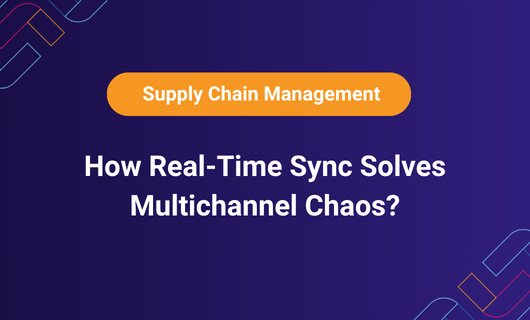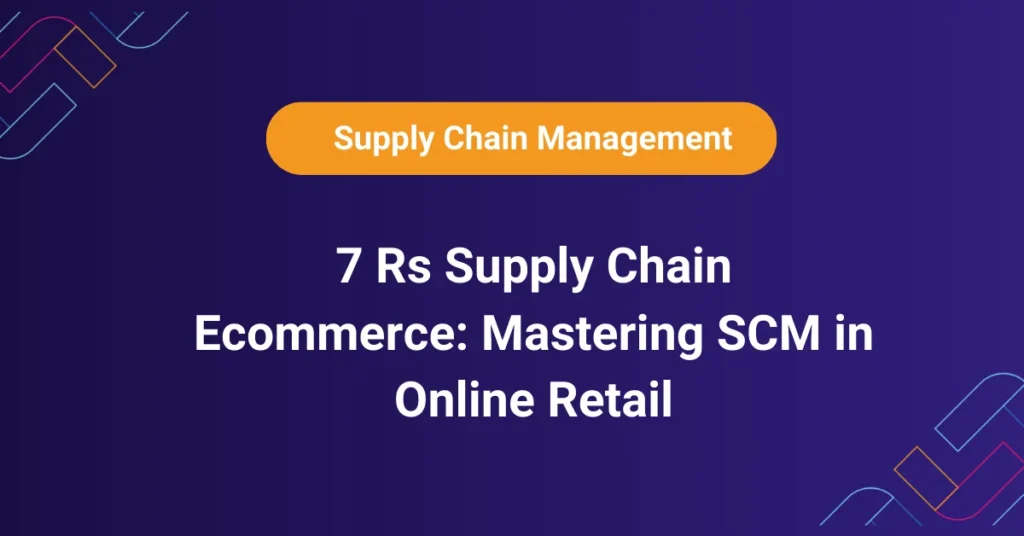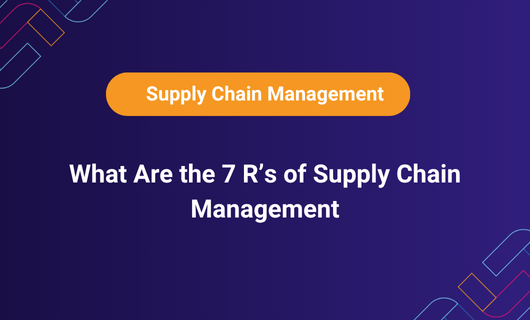In today’s fast-moving e-commerce landscape, success depends on how efficiently your business operates behind the scenes. If you’re selling across platforms like Amazon and Shopify, you’ve likely encountered two crucial systems: Enterprise Resource Planning (ERP) and Supply Chain Management (SCM). To truly optimize performance, many businesses now rely on smart supply chain and e-commerce metrics. A data-driven approach that bridges ERP and SCM, helping identify inefficiencies and drive smarter decisions across multiple sales channels.
While they may sound similar, these tools serve very different but equally vital roles in your operational ecosystem. An ERP system serves as the centralized brain of your business, helping you streamline everything from accounting to inventory management. At the same time, SCM focuses more on the logistics of getting products into customers’ hands.
The distinction between ERP and SCM isn’t just technical knowledge; it directly influences how you:
- Manage multi-channel inventory.
- Fulfill orders quickly and accurately.
- Scale operations across platforms.
- Eliminate delays, overselling, and manual errors.
Let’s break it down.
What Is ERP in E-Commerce? Benefits, Features & Use Cases
Enterprise Resource Planning (ERP) software acts as your centralized business management solution. It integrates your back-office operations, finance, HR, accounting, inventory, and order management into a single system.
Top ERP Benefits for Shopify & Amazon Sellers:
- Track financials across Shopify and Amazon
- Automate order-to-cash workflows
- Gain complete visibility into warehouse and inventory performance.
- Simplify multi-location operations and compliance.
Best ERP Platforms for E-Commerce Growth
- Brankit
- SAP Business One
- Odoo
A growing DTC brand selling through Shopify and Amazon FBA uses ERP to unify tax management, inventory tracking, and financial reporting from a single dashboard.
What Is SCM in E-Commerce? Role, Benefits & Real-World Use
Supply Chain Management (SCM) focuses on the external flow of products from sourcing raw materials to delivering the final product to the customer. For e-commerce brands, SCM ensures timely procurement, warehousing, and last-mile delivery.
Core SCM Functions: From Inventory to Last-Mile Delivery
- Supplier communication and relationship management
- Purchase order and inventory replenishment automation
- Inventory visibility across 3PLs and warehouses
- Fulfillment routing and logistics optimization
Top SCM Tools for E-Commerce Fulfillment & Inventory
- Brightpearl
- Skubana
- Zoho Inventory
SCM is essential for maintaining lean operations, meeting customer demand, and avoiding delays or stockouts.
ERP vs SCM Comparison: Which System Powers E-Commerce Growth?
| Feature | ERP | SCM |
| Primary Focus | Internal operations | External logistics and fulfillment |
| Core Functions | Finance, HR, CRM, and inventory control | Procurement, inventory movement, shipping |
| Best For | Financial accuracy and compliance | Fulfillment efficiency and real-time inventory |
| Key Integrations | Amazon, Shopify, QuickBooks | Amazon, Shopify, 3PLs, WMS |
Why Real-Time Shopify Amazon Sync Is Essential for E-Commerce Success?
Here’s a common pain point: You’re selling across both Amazon and Shopify, but your inventory data lives in silos. Stock levels aren’t syncing, and customers are paying the price.
- Overselling
- Stockouts
- Delayed fulfillment
- Lost revenue
Manual updates simply can’t scale.
That’s where Brankit steps in.
How Brankit Streamlines Shopify and Amazon Integration for Maximum Efficiency?
Brankit bridges the gap between ERP and SCM, acting as your unified operations layer to automate and optimize real-time workflows.
Brankit Features: Real-Time Sync, SKU Mapping & Operational Control
- Two-way inventory sync between Shopify and Amazon
- Real-time updates for orders, inventory, and fulfillment status
- Amazon FBA sync for multichannel fulfillment
- Automatic SKU mapping between systems
- Centralized dashboard for complete operational visibility
Compatible with Shopify Plus, Amazon FBA, ShipBob, and leading ERPs.
No more spreadsheets. No more human error. Just intelligent, scalable automation.

How Real-Time Sync Solves Multichannel Chaos?
Imagine you’re a fast-growing skincare brand in the U.S. running regular flash sales across Amazon and Shopify.
Each sale results in:
- Out-of-sync inventory
- Missed delivery SLAs
- Frustrated customers
Brankit eliminates these issues with:
- Real-time inventory sync
- Automated SKU-level tracking
- Fulfillment routing via FBA or 3PLs
Top brands like Glossier, Huel, and Allbirds use similar strategies to scale across platforms without breaking their backend.
Top Search Terms for Shopify Amazon Integration in 2025
Here are the top search terms decision-makers use when looking for inventory integration solutions:
- Shopify Amazon integration
- Shopify Amazon inventory sync
- Shopify Amazon order management
- Best Shopify Amazon sync tools
- Multichannel inventory sync for e-commerce
- Real-time Shopify Amazon sync
- Shopify Amazon FBA sync
- Shopify SKU mapping tool
- Amazon Shopify stock automation
Brankit ranks among the top solutions in all of these areas.
Why Choose Brankit? Benefits for Fast-Growing E-Commerce Brands
Centralize & Automate Operations
- Sync inventory across Amazon and Shopify
- Get real-time visibility into orders and fulfillment.
- Eliminate manual processes and human errors.
Improve Customer Experience
- Reduce overselling and stockouts.
- Deliver faster via Amazon FBA or third-party logistics (3PL) partners.
- Increase customer satisfaction and retention.
Save Time and Drive Revenue
- Say goodbye to spreadsheets.
- Reduce support costs
- Reinvest time into growth strategies
FAQs: ERP vs SCM, Shopify, Amazon Sync & Brankit Integration
1. What is ERP in e-commerce?
ERP manages internal functions, including finance, inventory, and HR, across all channels.
2. What is SCM in e-commerce?
SCM handles chaos?
Request a Demo and discover how Brankit can transform your supply chain operations, including product movement from supplier to customer, as well as logistics and fulfillment.
3. Can ERP and SCM work together?
Yes, combining both provides end-to-end visibility from financials to last-mile delivery.
4. How can I sync Shopify inventory with Amazon?
Use a platform like Brankit for automated, real-time inventory and order syncing.
5. What’s the best Shopify Amazon sync app?
Brankit offers robust features including SKU mapping, two-way sync, and FBA integration.
6. Does Brankit support Amazon FBA?
Yes, Brankit integrates with FBA for seamless multi-channel fulfillment.
7. Can Brankit map SKUs across platforms?
Absolutely. Brankit automates SKU mapping to ensure alignment across Amazon and Shopify.
8. Is Brankit right for DTC brands?
Yes. Brankit is built for fast-growing, DTC, and multichannel e-commerce brands.
9. Does Brankit support multi-location inventory?
Yes. Brankit enables complete control of inventory across multiple warehouses and 3PLs.
10. Is real-time sync available?
Yes, Brankit offers real-time data syncing to eliminate lags and errors in your operations.
Conclusion: Integrate ERP & SCM to Eliminate Chaos and Accelerate Growth
Choosing between ERP and SCM isn’t a matter of “either/or”; it’s about integrating both to unlock operational clarity and fulfillment agility.
Brankit acts as a bridge, helping U.S.-based e-commerce brands streamline their backend systems and eliminate the friction caused by disconnected platforms.
Request a demo today and scale your business without backend bottlenecks.





